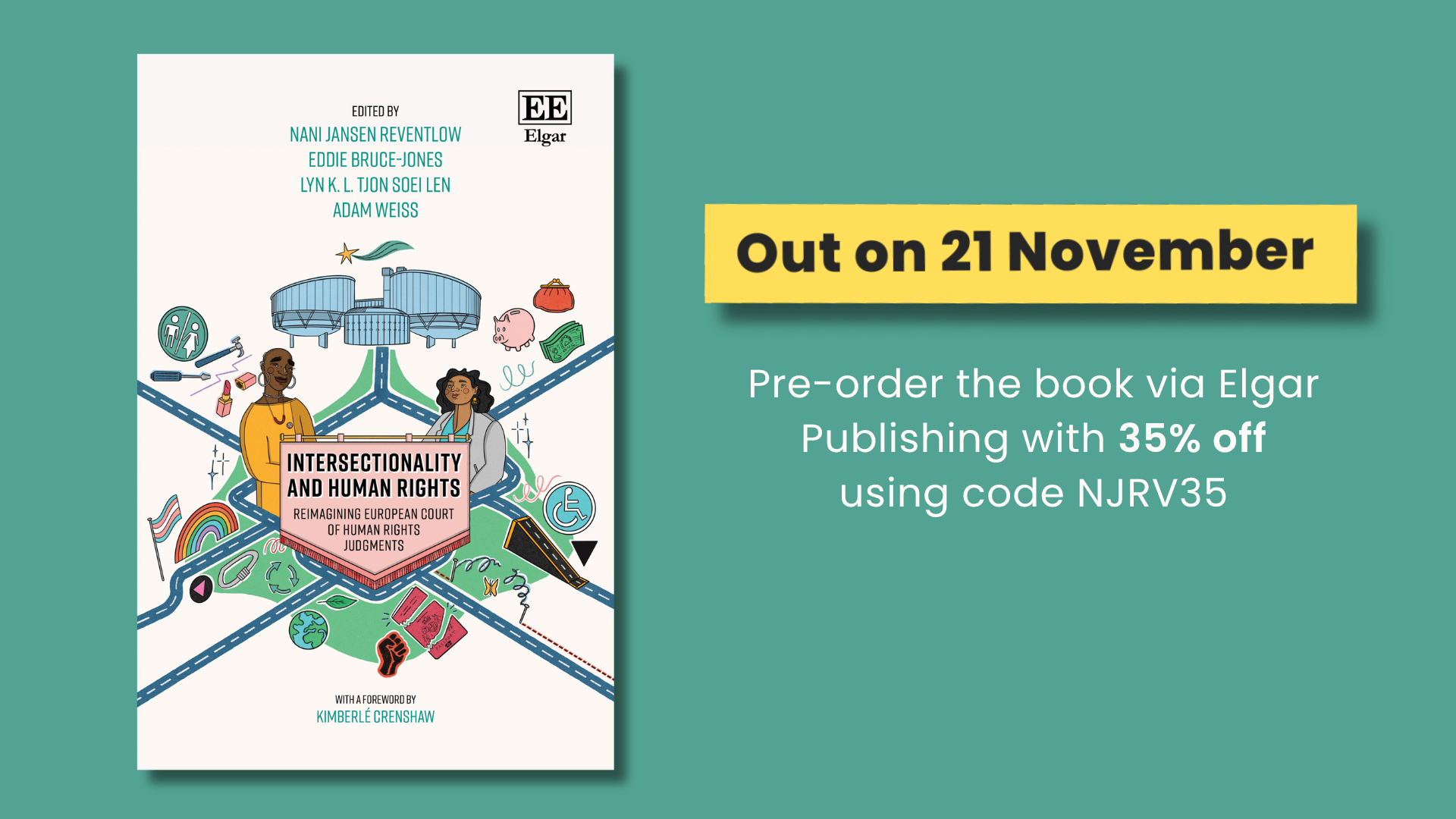The Book
The book “Intersectionality and Human Rights: Reimagining European Court of Human Rights Judgments” offers a set of reimagined judgments that take an intersectional approach to recent rulings from Europe’s highest human rights court.
The chapters represent not only reimagined judgments showing how a different representation of the legal facts, rationale, or case outcome shifts individual judgments, but in an important way also represent a reimagined Court. Each chapter starts with a personal essay from the author(s) in which they reflect on the choices made in applying an intersectional lens to cases where the Court could have, but didn’t, take an intersectional approach. While some rewrites stay close to the conventional style and voice of the current Court, others offer insight into what the Court may sound like if it represented a wider range of embodied knowledges of multiple marginalisation.
Below is an overview of the ways in which the rewrites are showing alternative jurisprudential pathways for a court that is more responsive to intersectional harms.
Benkharbouche and Janah v. the United Kingdom: The complex marginalisation of domestic workers
Nozizwe Dube rewrites Benkharbouche and Janah v. the United Kingdom (2022) concerning two Moroccan women involved in domestic labour of an exploitative nature for the embassies of Sudan and Libya in the UK. The rewrite illustrates how intersectional harms can be made visible by contextualising domestic work in the interlocking axes of racism, sexism, and classism which undergird and regulate (unpaid) labour. By centering contextualisation, the Court can develop equality jurisprudence that is attentive to the elusive dynamics of intersectional harm. Furthermore, the rewrite imagines a Court that not only resists, but also offers an alternative to the tendency to rigidly compartmentalise race, nationality, ethnicity, and religion. This alternative withstands the predominant invisibilisation of intricate processes of harmful racialisation in the European context.
Sanchez v. France: Power dynamics of gender, race, and religion in hate speech
Nawal Mustafa makes visible the complexities and asymmetries of power at play in the background of Sanchez v. France (2021), offering a detailed context on how race, religion, and gender play a role in the assessment of freedom of expression in relation to expressions of hate. The applicant, a politician affiliated with the far-right National Rally party in France, posted a message on social media which, although not inflammatory on its own, received racist and sexist comments publicly posted and directed at Muslim women in Nîmes. The rewrite brings forward what is at stake for multiple marginalised people who, even if not applicants in particular cases, are severely impacted by the Court’s considerations or dismissals of the relevance of intersectional axes of oppression.
Lacatus v. Switzerland: Begging as crime, begging as resistance
In rewriting Lacatus v. Switzerland (2021), Elif Ege relies on the contextualisation of income inequality in Switzerland to make the conditions that shape life for a poor, illiterate Romani woman understandable. The rewrite engages the intersections of gender, motherhood, race, and class showing how begging prohibitions disproportionately target Romani women for criminalisation. The intersectional analysis shows how begging represents not only a mode of survival under conditions of poverty and inequality, but is also a political act that requires protection as a form of freedom of expression. Begging prohibitions thus become visible as gendered, raced, and classed tools of the carceral state and as obstacles to human survival and freedom of expression.
Hudorovič and Others v. Slovenia: Antigypsyism and the exclusion from running water
Irmina Kotiuk rewrites Hudorovič and Others v. Slovenia (2020). The rewrite tells the story of Romani life in Europe and identifies how Slovenia bars access to clean water and sanitary facilities for Romani families, by making it conditional upon building permits. It places such conditions in the context of Roma as a marginalised, racialised and historically nomadic people and marks how the failure of the state to provide access to clean water disproportionately impacts women and children. While using a voice closely resembling the original judgment, Kotiuk comes to a radically different outcome which recognises how a failure to provide access to clean water, that is failure to protect the right to a healthy environment for all, is a clear human rights violation as an example of European environmental racism.
Terna v. Italy: The persistence of antigypsyism in the right to family life
In the rewrite of Terna v. Italy (2021) Senada Sali and Vivien Brassói offer valuable context to reveal the significance of State intervention in Romani family life in a wider context in which Romani culture is devalued. The case concerns the State’s removal of a Romani child from her primary parental figure — her grandmother — resulting in the child’s placement in foster care. The rewrite shows how the meaning of an intervention like this can only be appropriately assessed by accounting for the racial history of antigypsyism and reproductive injustice, and illustrates how both state inaction and action can represent obstacles for Romani families, women, and mothers to raise their children in safe, healthy, and supportive environments.
Kargakis v. Greece: Incarceration, disability, and the criminalisation of solidarity
This rewrite addresses the relation between incarceration and (state produced) disability. In rewriting Kargakis v. Greece (2021) Nicolette Busuttil centres the applicant’s account of what happened, highlighting the presence of their voice in the legal narrative. The applicant is a Greek man with disabilities who acts in solidarity with migrants crossing the border. The rewrite reframes the Court’s characterisation of the facts in law by invoking the Convention on the Rights of Persons with Disabilities and centres disability as a pivotal axis through which to understand carcerality. It shows how the necessity and possibility of solidarity, and its criminalisation by the State, must be assessed in relation to the positionalities of those figuring in the background: the migrants seeking to cross European borders. This calls into question the criminalisation of solidarity in the context of global migration patterns, which are inextricably connected to colonial and imperial European histories.
N.C. v. Turkey: The socio-cultural fabric of rape and its aftermath
Hermine Letonde Gbedo, Veronica Saba, and Linda Pavanello rewrite N.C. v. Turkey (2021) by centring the voice of the applicant — starting with her account of what happened and what she experienced. The applicant is a young, poor, Kurdish girl who suffers the long-term ramifications of rape by state actors in the context of war. The rewrite deliberately shows how the intersections of age, gender, class, and ethnicity form the fabric of the applicant’s experience, including “shame” and reputation harms, in a political context of war between the Turkish state and the Kurdish people. The rewrite offers an insight into the unique texture to the discrimination and human rights violations experienced by women and girls based on age, gender, ethnicity, and class, reframing the judgment as a case of human trafficking and sexual exploitation and emphasising the importance of using sensitive language to avoid secondary victimisation.
A.H. and Others v. Germany: Stopping States from Deadnaming Parents
Arpi Avetisyan’s rewrite of A.H. and Others v. Germany (2023) shows how restrictive application, of family law can serve to enforce binary heteronormative cisgender norms. A.H. and Others v. Germany concerns a case in which the state refuses to register a transgender woman as a child’s mother. The rewrite challenges assumptions about parenthood, privacy, and identity, and shows how there is no legal requirement for a sex-gender categorisation that requires “deadnaming”. In addition, Avetisyan shows how rather than setting up a clash of interests between child and parent, a legal analysis of “the best interest of the child” entails the law to recognise the relationship children have to the actual parents they have, which requires recognition of their identities and who they are.
Berkman v. Russia: Securitisation and surveillance of LGBTQIA+ people
Keio Yoshida and Jonathan Ward rewrite Berkman v. Russia (2020), which concerns police violence in the context of a LGBTQIA+ protest in Russia. The rewrite frames the role of the police in reference to and recognition of the historical and disparate relation and impact of police across multiply marginalised communities. By centring lived experience of multiple marginalisation and specificity of a fraught history with police, the rewrite highlights how police presence impacts people in disparate ways. In doing so, Yoshida and Ward address the law’s complicity in securitisation and surveillance of LGBTQIA+ people and highlight the role of state power, surveillance, and police violence targeting LGBTQIA+ people.
Bumbeş v. Romania: Privilege and marginalisation in environmental protest
The rewrite of Bumbeş v. Romania (2022) by Tatu Hey and Sheena Anderson concerns a protest in the capital against a mining project in solidarity with a local community and shows how the applicant’s solidarity through protest is differently positioned from those who would be directly impacted by the planned mining project. Highlighting this different positioning between direct stakeholders and protester brings forward the significance of how intersectional axes shape the ability, stakes, and costs of protest. The rewrite shows how environmental justice is necessarily intersectional in nature within a global capitalist economy where the environmental costs are disproportionately externalised and imposed on multiple marginalised communities across the globe.
Bahoumou Totopa v. Spain: Colonial Legacies, Migration & Family Separation
Kat Zhou rewrites the case Bahoumou Totopa v. Spain (2022), exploring the intersections between colonial history, migration, and bureaucratic violence. Framing this case as one about the state-imposed separation between a mother and her child, Zhou draws attention to how a family’s trauma gets prolonged by the shifting bureaucratic goalposts and rigid structures of migration control. French colonial legacies in Côte d’Ivoire not only manifest in migration control, but also underlie the harms imposed on uprooted and separated families. The rewrite details the case as one that exemplifies “bureaucratic violence,” where oppressive decisions are veiled under the guise of rules, regulations, and formal procedures, thereby legitimising the disenfranchisement of those who endure such verdicts.
Big Brother Watch and Others v. the United Kingdom: Metadata and Digital Surveillance of Marginalised Populations
Big Brother Watch and Others v. The United Kingdom (2021) is rewritten by Sylvia Kamanja and addresses the risks and human rights harms involved in state practices of digital surveillance on populations experiencing intersecting forms of marginalisation. Digital surveillance and the accumulation and collection of personal information have accelerated rapidly over the last decades under the guise of increased public safety. Kamanja approaches public safety narratives critically, emphasising the necessity of applying an intersectional perspective to assess the impact of surveillance measures on marginalised people. The rewrite shows that human rights harms can arise, especially as a result of metadata collection — data about communications rather than their content — because such data can reveal intricate patterns about an individual’s life and disproportionately affect marginalised communities already under heightened scrutiny through the reinforcement of prejudice and bias.
Artwork for the project is by Tamara-Jade Kaz.

